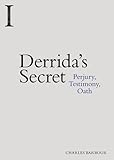Derrida's secret : perjury, testimony, oath / Charles Barbour.
Material type: TextSeries: Publication details: Edinburgh : Edinburgh University Press, (c)2017.Description: 1 online resource (x, 292 pages)Content type:
TextSeries: Publication details: Edinburgh : Edinburgh University Press, (c)2017.Description: 1 online resource (x, 292 pages)Content type: - text
- computer
- online resource
- 9781474425018
- B2430 .D477 2017
- COPYRIGHT NOT covered - Click this link to request copyright permission: https://lib.ciu.edu/copyright-request-form
| Item type | Current library | Collection | Call number | URL | Status | Date due | Barcode | |
|---|---|---|---|---|---|---|---|---|
 Online Book (LOGIN USING YOUR MY CIU LOGIN AND PASSWORD)
Online Book (LOGIN USING YOUR MY CIU LOGIN AND PASSWORD)
|
G. Allen Fleece Library ONLINE | Non-fiction | B2430.484 (Browse shelf(Opens below)) | Link to resource | Available | on1002303682 |
Includes bibliographies and index.
Introduction : Cavernosis anfractibus -- Under oath : secrecy, perjury and the social bond -- Open secrets : literature, politics and testimonial truth -- Between two solitudes : self-deception, consciousness and the other mind -- Being alone : death, solitude and the end of the world -- Conclusion : secretions.
The Snowden Affair, Wikileaks, the 'lone wolf' terrorist, Clinton's private email account - the secret is arguably the central element of our contemporary political experience. Now, Charles Barbour looks at the basic ontological question 'what is a secret?' Organised as a reflection on Jacques Derrida's later writings on secrecy, four chapters each look at a separate problematic: society and the oath, literature and testimony, philosophy and deception, and time and death. Barbour shows that secrecy is not a negation of our relations with others, but a necessary condition of those relations. We can only reveal ourselves to one another (and, indeed, to anything other) insofar as we conceal as well.
COPYRIGHT NOT covered - Click this link to request copyright permission:
There are no comments on this title.
